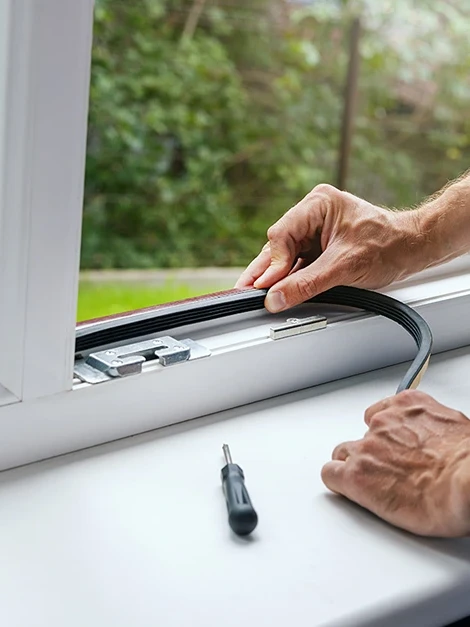Double glazing has become a staple in homes across the United Kingdom, known for its ability to enhance thermal efficiency, reduce noise pollution, and increase property value. However, to ensure these windows continue to perform optimally, regular maintenance is essential. This article delves into the various aspects of double glazing maintenance, offering practical advice and solutions.
Considering replacement windows?
Key Takeaways:
- Understanding the Basics: Double glazing is essential for thermal efficiency and noise reduction.
- Regular Maintenance: Cleaning and inspecting seals are crucial for longevity.
- Preventing and Addressing Issues: Tackling condensation and troubleshooting common problems are key to maintaining double glazing.
Understanding Double Glazing Maintenance

What is Double Glazing?
Double glazing involves two glass panes within a single window frame, separated by a vacuum or gas-filled space to reduce heat transfer and noise. This design is pivotal in maintaining a comfortable home environment, particularly in the varied UK climate.
Benefits of Double Glazed Windows
- Energy Efficiency: Reduces heat loss, leading to lower heating bills.
- Noise Reduction: Offers a barrier against external noise.
- Increased Security: Tougher to break than single-pane windows.
- Reduced Condensation: Limits moisture build-up on window panes.
Regular Cleaning and Care
Maintaining the clarity and functionality of double glazed windows involves routine cleaning and inspection. Here’s how to keep them in top condition:
Cleaning Techniques for Double Glazed Windows
- Frequency: Clean every three to six months.
- Method: Use a mixture of mild detergent and water.
- Avoid: Harsh chemicals that can damage seals and frames.
Table 1: Recommended Cleaning Schedule and Techniques
| Part of Window | Cleaning Frequency | Cleaning Method |
| Glass Panes | Every 3-6 months | Mild detergent |
| Window Frames | Every 4-6 months | Soft cloth |
| Seals | Bi-annually | Gentle wipe |
Products to Use and Avoid
- Use: Soft cloths, mild detergents, and soft-bristled brushes.
- Avoid: Abrasive cleaners, high-pressure hoses, and sharp tools.
Inspecting Seals and Gaskets
The integrity of seals and gaskets is crucial in maintaining the efficiency of double glazed windows.
Importance of Seal Integrity
- Prevents Moisture: Ensures no condensation between panes.
- Maintains Insulation: Keeps the gas layer intact for optimal insulation.
Identifying and Addressing Seal Issues
- Visual Inspection: Look for cracks or gaps in the sealant.
- Touch Test: Feel for drafts around window edges.
- Professional Assessment: If unsure, seek advice from a window specialist.

Handling Condensation and Moisture
Condensation can be a common issue with double glazing, particularly in the colder months.
Causes of Condensation in Double Glazing
- Temperature Difference: Warm interior air meets cold external glass.
- Humidity: High levels of moisture inside the home.
Preventive Measures and Solutions
- Ventilation: Ensure adequate air circulation.
- Dehumidifiers: Use in high-humidity areas like kitchens and bathrooms.
- Regular Checks: Monitor for signs of seal failure.
Table 2: Condensation Prevention Strategies
| Strategy | Description | Benefit |
| Adequate Ventilation | Ensuring air circulation in the home | Reduces moisture build-up |
| Use of Dehumidifiers | In high humidity areas | Controls internal moisture levels |
| Seal Checks | Regular inspection of window seals | Prevents moisture ingress |
Troubleshooting Common Issues
Addressing Draughts and Leaks
- Identify the Source: Check for gaps or sealant failures around the window frame.
- Weather Stripping: Apply or replace weather stripping to seal gaps.
- Professional Repair: If draughts persist, consult a window specialist.
Fixing Stuck Windows and Doors
- Lubrication: Apply a silicone-based lubricant to moving parts.
- Alignment Check: Ensure the window or door is properly aligned in its frame.
- Avoid Force: Never use excessive force to open or close.
Professional Maintenance Services
When to Call a Professional
- Complex Issues: For problems beyond basic maintenance.
- Regular Check-ups: Bi-annual or annual professional inspections.
What to Expect from a Maintenance Service
- Comprehensive Inspection: Checking all aspects of the window.
- Expert Repairs: Addressing any identified issues.
- Advice: Tips for ongoing maintenance.

Longevity and Replacement
Lifespan of Double Glazed Windows
- Average Lifespan: Typically, 15-20 years, depending on quality and maintenance.
- Factors Affecting Longevity: Exposure to elements, usage frequency, and maintenance quality.
Signs That Indicate the Need for Replacement
- Persistent Condensation: Between the panes.
- Noticeable Draughts: Even after sealing.
- Difficulty in Operation: Sticking or jamming windows.
Table 3: Indicators for Double Glazing Replacement
| Indicator | Description | Action Suggested |
| Persistent Condensation | Moisture between panes | Consider replacement |
| Noticeable Draughts | Air leakage around frames | Seal check or replacement |
| Operational Difficulties | Sticking or jamming windows and doors | Repair or replace |
FAQs on Double Glazing Maintenance
Ideally, every 3-6 months to maintain clarity and inspect for any damage.
It’s possible, but not recommended unless you have experience. Professional service is advised.
It’s usually due to a failure in the window’s seal, allowing moisture to enter between the panes.
Look for signs like condensation between panes, draughts, and difficulty in opening or closing.
It depends on the extent of the damage. Sometimes, replacement is more cost-effective.







